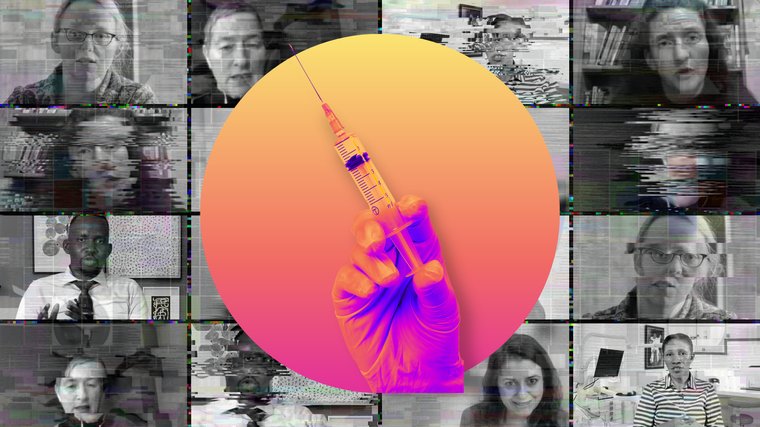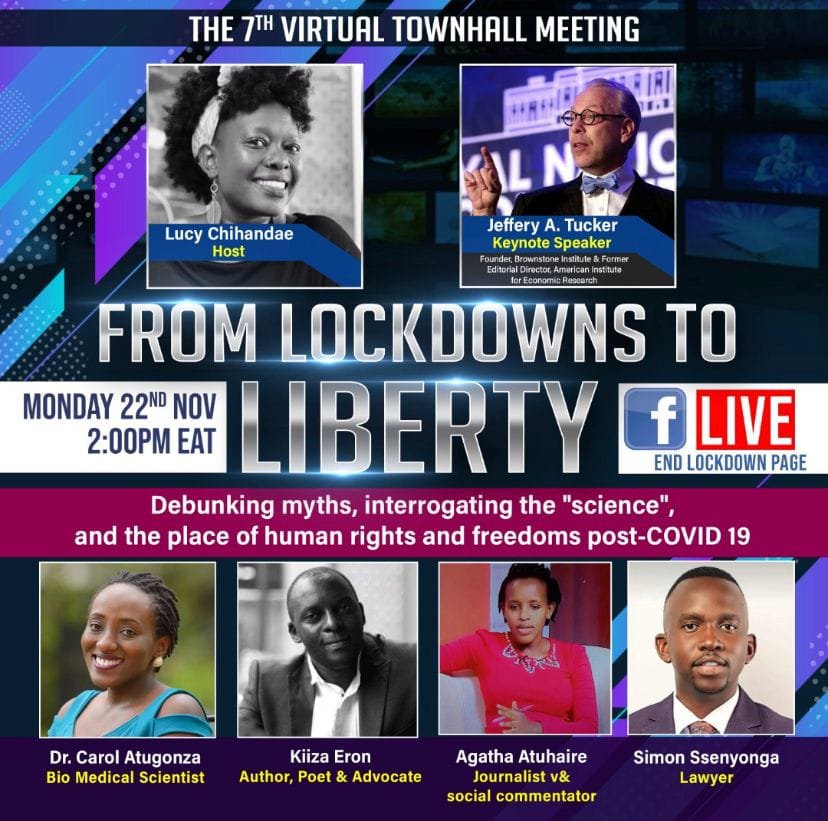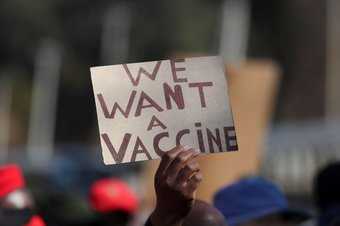
US conservatives spreading anti-vax misinformation to unvaccinated Uganda
Revealed: US Christian legal organisation and a Texas-based think tank are among those promoting anti-lockdown and vaccine hesitancy messages in Uganda

US conservative groups, and writers and scientists from the UK, the Netherlands and Australia are among the international actors supporting a campaign spreading COVID-19 misinformation in Uganda, it can today be revealed.
A joint investigation by media non-profit the Citizens and openDemocracy has found that:
US Christian legal organisation Alliance Defending Freedom (ADF) and Texas-based libertarian think tank the Brownstone Institute are among the organisations backing Uganda’s ‘End Lockdown Now’ campaign.
The Brownstone Institute’s founder told Ugandans at an online event: “There’s no real case for getting a vaccine if you’ve had natural immunity. It doesn’t make any sense.”
End Lockdown Now has platformed anti-vax, anti-mask, anti-lockdown and pandemic-denying arguments, with journalists and scientists from Europe and Australia among those spreading misinformation to Ugandans at the group’s online events. One such event was hosted by ADF.
Separately, ADF has also involved itself in three legal challenges opposing lockdown measures in Uganda.
Uganda's Ministry of Health said it would investigate the End Lockdown Now campaign as a result of this investigation.
Just 5% of Uganda’s population is fully vaccinated, with the country on the cusp of reopening after one of the world’s longest and toughest lockdowns. Last week the virus was the number two cause of death in the country.
End Lockdown Now was launched in June by Ugandan lawyer and preacher Simon Ssenyonga, It has platformed arguments for the use of ivermectin, an unproven treatment for the virus, and a recent Facebook post shared by the campaign claims that PCR testing is not a valid way to detect COVID. Ssenyonga insists his organisation is “not a misinformation campaign” and says it does not “propagate” the use of ivermectin.
Brownstone Institute founder Jeffrey Tucker, who made the “natural immunity” claim, also stated falsely at the same event that COVID-19 vaccines were “a technology that’s not been proven as safe and effective”.
End Lockdown Now’s events have been covered widely and uncritically in local media, and shared by social media influencers with tens of thousands of followers. Its hashtag #EndLockdownNow has trended on Ugandan Twitter at least twice – in July and November – and Ssenyonga claims each event is now achieving 15 million impressions on social media. “But when I have a big person like Tucker,” he told the Citizens and openDemocracy, “there’s a cross-sharing of audiences […] so they reach maybe 50 million around the world.”
Ssenyonga has appeared across Ugandan media to promote his campaign, although local channel NTV published a statement last year distancing itself from comments he made “that could be interpreted to challenge the advice given by the Ministry of Health”.
He added that he was “one of the many concerned individuals who were concerned about the clear lockdown injustices and seriously resisted it through the campaign”, but would not give further details on who else was involved.

Ssenyonga said his campaign approached ADF as part of its search “for potential partners or entities which are speaking the same language as you're speaking”, but denied ADF had provided any cash, saying it plays “a supportive role […] in terms of knowledge”.
ADF hosted an End Lockdown Now event in which Ugandan pharmacist Eva Mugisa claimed she has been treating people with ivermectin, though ADF representatives did not make any unfounded claims themselves.
Writers attached to Tucker’s Brownstone Institute have been a common thread through many of the online events for End Lockdown Now. At one event, Netherlands-based immunologist Carla Peeters said she believed COIVID-19 had already entered its “endemic” stage, meaning it was no longer a pandemic. She also claimed masks do not prevent transmission and that the virus is “not that dangerous for younger people”.
Gigi Foster, another Brownstone author and professor with the School of Economics at the University of New South Wales, Australia, claimed at another event that lockdowns are “the wrong thing for public health” and said politicians around the world are “facing personal incentives to keep the narrative going”.
A number of key players at the Brownstone Institute, including Tucker himself, were involved in writing the Great Barrington Declaration – an online statement promoting ‘herd immunity’ through mass infection approach to the pandemic, a strategy criticised as “unethical” by the World Health Organization.
Written in October 2020 following a conference hosted by the American Institute for Economic Research – the libertarian, climate-denialist think tank where Tucker was previously editorial director – the declaration argues that COVID-19 should be allowed to spread in the young and healthy, with “focused protection” of those at higher risk.
The declaration’s authors have successfully lobbied governments – meeting with political leaders including UK prime minister Boris Johnson and senior advisers to US president Donald Trump. In 2020, Johnson met with Great Barrington Declaration author Sunetra Gupta just 24 hours before he stated that he wasn’t going to impose lockdown, an investigation by openDemocracy found.
“We thought that the Barrington Declaration offered something which was reasonable, something which was based on science,” said Ssenyonga, adding that the authors’ credentials made him “even more critical” of government COVID-19 mandates.
According to Scientific American magazine, sponsors of the Great Barrington Declaration are “further accelerating” the anti-science, anti-vaccine trends from the US to other countries around the world.
Related story
As well as Brownstone, Uganda’s End Lockdown Now campaign has brought in ‘COVID sceptics’ associated with other groups. For example, Sonia Elijah, a British journalist who has written for outlets that have platformed misinformation, including Conservative Woman and TrialSite News, claimed during one online event that masks are a “psychological warfare weapon” and that “vaccines do not prevent infection”.
At another online panel in December, Clare Craig, a pathologist and member of the UK’s Health Advisory and Recovery Team – an influential group that has been accused of spreading COVID disinformation – described ivermectin as a “safe drug” that can be used to prevent and treat COVID-19, but said those claiming this have experienced “censorship and attacks”.
Gavin Yamey, a professor of global health and public policy at Duke University, North Carolina, described Tucker’s claims that vaccines had not been proven safe and effective as “horrific nonsense”.
“The COVID-19 vaccines were studied in multiple randomised controlled trials, they have been given to billions of people, and they are astoundingly safe and effective, including in children. Vaccines are a critical tool for ending the pandemic, and here we have one of the architects of the Great Barrington Declaration peddling an extremely dangerous, false view,” added Yamey.
“It’s alarming that […] a man who helped to sponsor and edit the Great Barrington Declaration is now spreading awful anti-vaccine disinformation beyond the United States.”
Asked for comment, Tucker said: “Though neither scientist nor doctor, I am a fan of vaccines for those who will benefit from them and the Brownstone Institute has published articles favouring vaccination against COVID. Lockdowns are the worst assault on the poor, working-class communities and small businesses all over the world.”
Last week it was reported that Uganda will destroy some 400,000 vaccine doses that expired following low uptake
There are likely to be several factors involved in Uganda’s low vaccination rate. The country’s 5% fully jabbed rate compares to 53% globally and 9% in Africa.
The issue is partly one of supply and access, with Western countries having hoarded doses, including doses of vaccines that are actually being produced in Africa. Lower-income countries are reportedly being charged more than higher-income countries, such as those in Europe, for the same vaccines. Meanwhile, some pharma companies are refusing to waive patent rights on their vaccines, which would enable poorer countries to produce the jabs themselves instead of importing them.
Allana Kembabazi, a lawyer focused on health rights at the Initiative for Social and Economic Rights Uganda, said: “The elephant in the room is that we don’t have enough supply, and whether it’s there can depend on goodwill.
“So we’ve been doing a lot of work around the TRIPS waiver [the option to override intellectual property and copyright laws in exceptional circumstances for public health reasons, part of a World Trade Organization agreement] and trying to increase supply.”
The low rate can also partially be attributed to hesitancy. In a nationwide survey seen by the Citizens and openDemocracy of 3,000 Ugandans by Twaweza East Africa, a ‘citizen-centred’ non-profit organisation, only 24% said they believed COVID-19 vaccines prevent severe illness. Last week it was reported that Uganda will destroy some 400,000 doses of vaccines after they expired following low uptake in the north of the country.
A history of colonial medical and vaccine research abuse in Africa has contributed to mistrust in current vaccine programmes on the continent. Vaccine nationalism, discriminatory travel bans and even suggestions that Africans be used as guinea pigs for COVID-19 drugs have all likely contributed to hesitancy.
Kembabazi recalls the conversation she had with one of her uncles about the vaccine. “He started off with: ‘I heard people in the village saying that they’re trying to wipe us out.’ I said: ‘If they were trying to wipe us out, why did the wealthier countries hoard the vaccine?’” Her uncle laughed and eventually took her point, but continued to be hesitant when he realised he was going to have to miss a day’s work to queue to get his jab, without knowing if or when he would get a second dose. In this way, the supply issue has also exacerbated hesitancy.

All the same, misinformation spread online by groups like End Lockdown Now is likely to be a factor in many Ugandans’ disinclination to get vaccinated. While the Twaweza survey found that Uganda as a whole has 85% vaccine willingness, a third of people surveyed in Kampala, Uganda’s capital, were vaccine-hesitant. In addition, 21% of people in the Central Region (where Kampala is located) stated they were not willing to be vaccinated – compared to lower hesitancy rates of 11-15% in two of Uganda’s other regions.
“It’s connected to how much information people are getting,” says Marie Nanyanzi, senior programme officer at Twaweza. People in urban areas, she points out, have more access to social media platforms such as Facebook and WhatsApp, which in turn increases their chance of reading misinformation.
There’s another cultural factor that might be at play. More than 80% of the Ugandan population is Christian, and while places of worship in the country reopened in September (with a limit of 200 people per congregation) they had been forcibly shut down for most of the pandemic.
End Lockdown’s Now’s social media campaign has focused on this issue, meaning opponents of lockdown have ended up being exposed to anti-vaccine messaging too. ADF, which is supporting three legal challenges opposing limits on public worship, backed a similar successful challenge in Scotland, and has filed federal lawsuits challenging vaccine requirements in the US.
ADF lists two of its staff members as the advocacy team involved in the separate Ugandan court cases challenging the ban on public worship. According to ADF’s declaration of overseas spending, it spent $19,690 in Sub-Saharan Africa on “human rights legal work” in 2019. Filings for expenditure during the pandemic are not yet available. openDemocracy revealed last year that the organisation, deemed an “anti-LGBTQ hate group” by the Southern Poverty Law Center, had spent a total of $137,284 in African countries since 2007, including on grants, scholarships and legal work.
In response to our findings, Uganda’s Ministry of Health said: “We condemn any campaign that is meant to mislead the public with false and misleading information on the COVID-19 response and the ongoing vaccination. We are going to investigate this campaign and its intention. As a Ministry of Health, we only rely on scientifically backed information.”
Nicholas Opiyo, a renowned Ugandan human rights lawyer known for defending LGBT rights, appeared on one of the End Lockdown Now panels but told the Citizens and openDemocracy: “I do not in any way share their views. If I had done my bit to trace these groups, I may not have joined them anyway.” He admitted he had not researched the campaign before agreeing to speak.
“The Christian Right have been trying to influence […] around HIV/AIDS, our sexual education programmes, LGBTI, so COVID will be no exception. So I'm not surprised. I just hope that people can see through that and stick to the science,” Opiyo added.
End Lockdown Now is not registered as an organisation in Uganda, meaning it is not required to declare its funding. Ssenyonga told the Citizens and openDemocracy that its costs were covered by its Ugandan co-founders and supporters, and denied the involvement of any western groups in its funding, including the ADF.
This story was published in collaboration with media non-profit the Citizens.
Read more
Get our weekly email





Comments
We encourage anyone to comment, please consult the oD commenting guidelines if you have any questions.